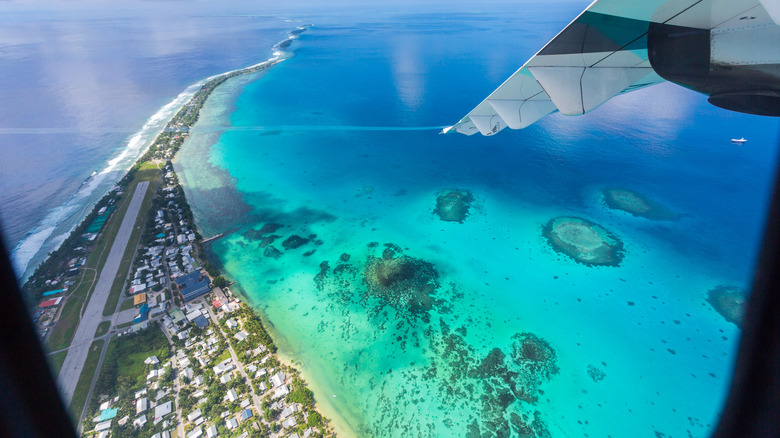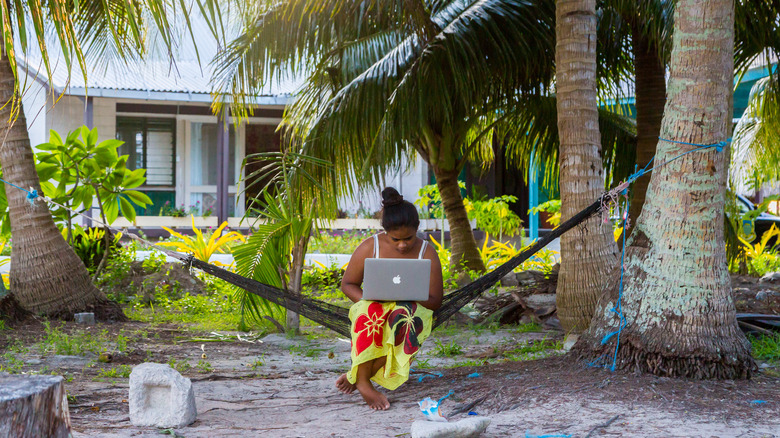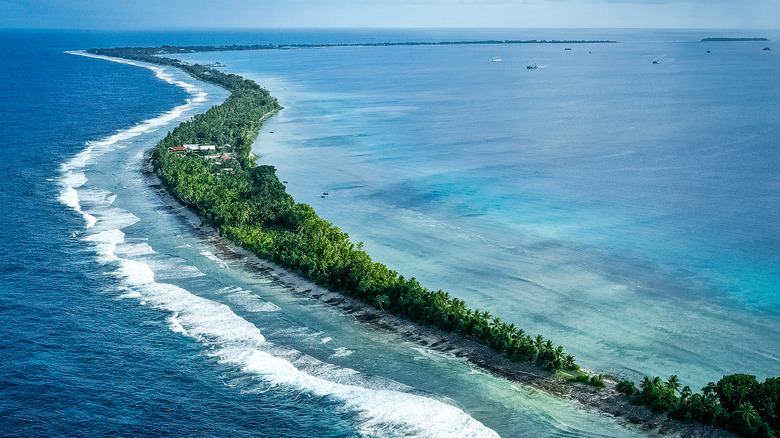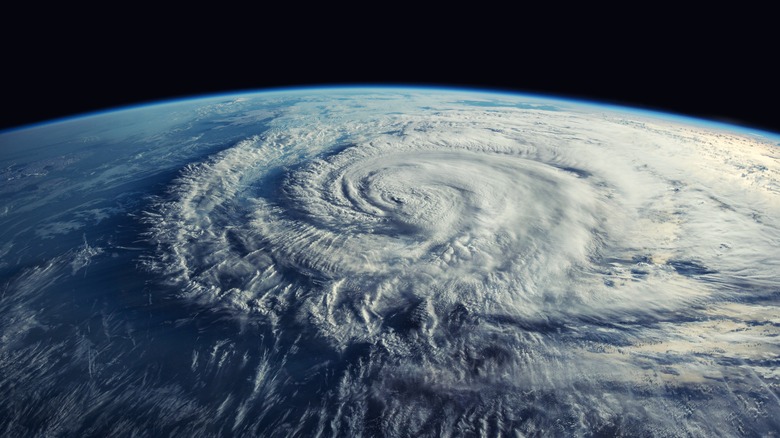How The World's First Digital Nation Will Work
The digital world promises a refresh to the lives we lead. Just a few decades before our own, the internet was beginning to find its way into the average household. It offered the first dose of a digital community space in which anyone could reinvent themselves as whatever they imagined. Gaming brought forth an interactive and imaginative world of possibility in which avatars with amazing superpowers, physical strength, or intuition and cunning took center stage.
Much has been said about the dark parallels between the chilling digital dichotomy of "The Matrix" premise of real world versus simulation, mapped onto what the internet has become as it continues to age (as explained in Consequence or The New York Times). And the notion of a new rebirth of sorts for the digital space that we experience in real life, a la "the metaverse," for instance, is something to be celebrated. With a new iteration of what the internet is and can be, users may be looking at the first breaths of a new and vibrant digital community space that shakes off the deadweight that malicious users heaped onto the existing model for digital communication over decades.
It's not a given, of course. The second digital sphere that encompasses virtual reality plugins and suits that resemble science fiction storytelling (like this one inspired by the movie "Ready Player One") might very well fall victim to the same kinds of ill-intent that have developed our existing internet into a mixed bag of critical resources and hazardous corners, perhaps even rising to the extent of that featured in "Ready Player One."
But in this forming space, something of pure positivity is already being built: The world's first digital nation.
Climate change collides with the digital domain
Simon Kofe, the minister of justice for the island nation of Tuvalu recently announced plans at the COP27 summit to digitize the entire island (via ItsNiceThat). This project, one that might be met with great aplomb under normal circumstances, is one of preservation and survival rather than simple early movement in the space. The climate change crisis impacting the world is shrinking coastlines all around the globe, and Tuvalu has found itself placed firmly in the crosshairs of impending disaster.
Tuvalu is expected to become the first nation in a long chain of dominoes to fall victim to complete destruction at the hands of a steadily rising sea level. NASA reports that rising ocean heights are a direct result of human activity across the planet, and that much of this change is due to melting glacial ice in the poles. As more ice melts each year (compared to prior levels of seasonal melt and including permafrost that wouldn't historically experience yearly volumetric changes), these frozen water bodies are spilling into the global volume of liquid water across much of the Earth's surface. Phys.org also reports that polar ice is critical for reflecting heat and solar radiation back out into space, protecting the natural equilibrium temperature and environment that all live on Earth relies on. As these masses shrink, this barrier is eroding at an increasing pace.
Tuvalu is undergoing a virtual upload in real time
As a result of this existential threat to the nation of Tuvalu, it's predicted that the entire country could become a real-life Atlantis and submerge permanently beneath the Pacific within the next century (via Shift). Tuvalu is already well-versed in the world of digital finesse: The Washington Post reports that it has been cashing in on its .tv domain coda for decades. So it's only natural that the island community would have an instinct for where to turn when the physical world began to encroach on its territory and history.
The nation has decided that instead of relying on a global effort to slow (or perhaps even reverse) the scourge of rising sea levels, global temperatures, and all that follows, the community is taking it upon themselves to save their cultural record. The world has shown a penchant for inaction and half measures (via The Brookings Institution, Chatham House, and London School of Economics), and the people of Tuvalu have decided that waiting for change is likely a submission to a watery grave.
Instead, Tuvalu has partnered with The Monkeys and Collider (artistic, film, and advertising firms) to digitize the entirety of this island home so that future generations can explore the space, even if it succumbs to a slow engulfment by the sea, according to ItsNiceThat.
These digital scans are taking place right now and will become a part of the digital metaverse of the future.
Starting with Teafualiku Islet, Tuvalu is preserving its heritage
Tuvalu's official web address, Tuvalu.tv, reports that the first part of the country that will be affected by rising water levels is Teafualiku Islet, and so they have begun with this segment in their preservation efforts.
The internet is a place of wonder and innovation, and Tuvalu is using the full weight of this digital space to reimagine what it means to preserve and valorize a national consciousness and heritage. With the help of the digital realm, Teafualiku Islet and eventually the whole of the country will be digitized and uploaded to the virtual realm for unlimited exposure to what will surely result in a global diaspora if the worst comes to pass. In the same way that Johnny Depp's Dr. Will Caster uploads his consciousness to the AI system that is his life's work in an effort to defeat death itself in the movie "Transcendence" (via IMDB). The similarities depart there, however. In the film, Caster's mind quickly seeks out more and more information, processing power, and autonomous capacity after merging with the AI. This eventually leads to the destruction of technological advancements that make the world the place that we all recognize.
Tuvalu's aims are far less dystopian, even if they stem from a nightmarish scenario of veritable extinction. By developing this nuanced repository of physical and cultural data, the government is enshrining the values and heritage of the Tuvaluan people for an eternity.
If meaningful change isn't made quickly, others may be forced to follow
Reuters notes that Seoul, South Korea, and Barbados have each launched individual initiatives to build out metaverse identities of their own. These entities will be focused on providing public services in a streamlined manner, but the rollout of various physical spaces in this environment remains both a somewhat novel concept and a cutting edge opportunity to gain functionality or to attain self-preservation.
According to a report from the Organisation for Economic Co-operation and Development (OECD), Kolkata, Mumbai, Dhaka, and Guangzhou stand to face a total population exposure to rising ocean levels in the next 50 years of more than 10 million people. Similarly, Miami, Guangzhou, and the New York-Newark metro area will see a total asset exposure of more than $2 billion each. Both populations and assets can expect dramatic levels of catastrophe if current trends in climate change aren't taken seriously in the coming years. It's long been known that rising seas have posed an existential threat to island nations and large landmasses alike, but this effort by Tuvalu puts the endgame into stark terms. Climate Central provides a similar mapping resource that should be of interest to anyone living in a coastal area. Playing around with the toggle options can give you a sense of just how much risk you might be exposed to in your own home.




